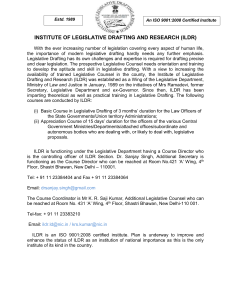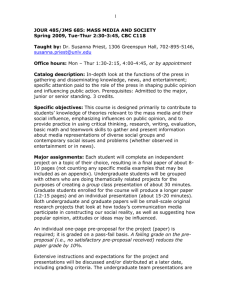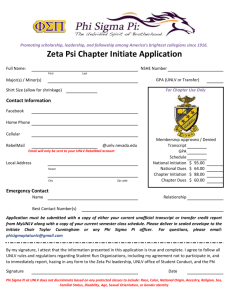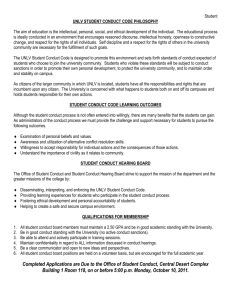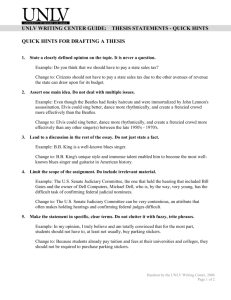Course Syllabus - IAALS | Institute for the Advancement of the
advertisement
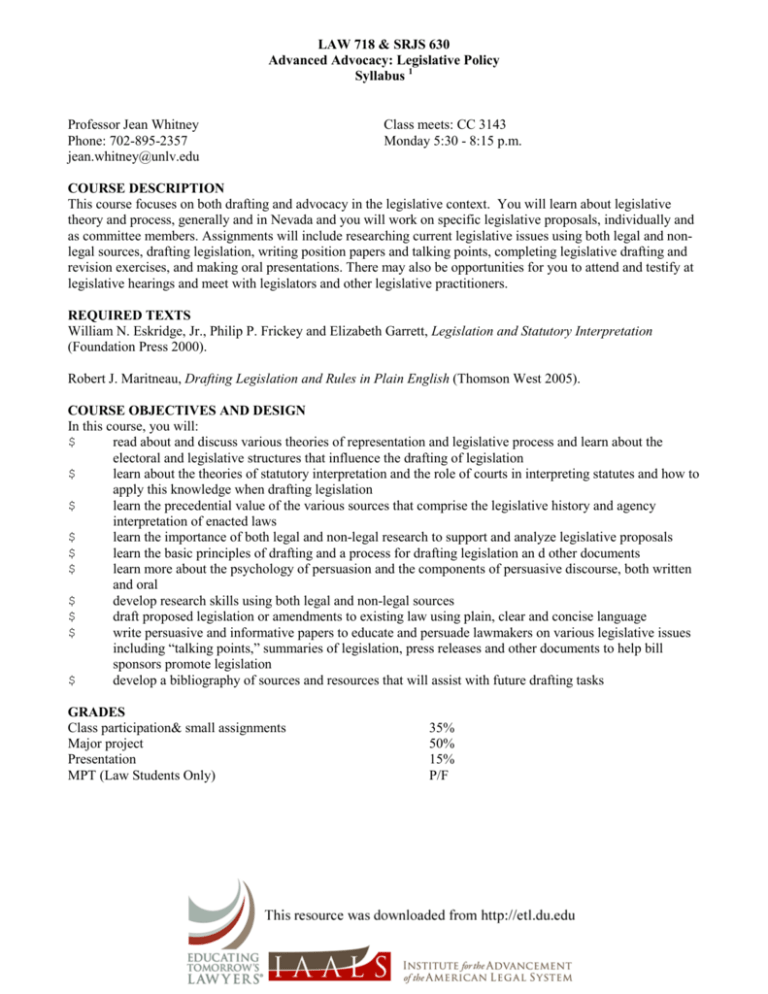
LAW 718 & SRJS 630 Advanced Advocacy: Legislative Policy Syllabus 1 Professor Jean Whitney Phone: 702-895-2357 jean.whitney@unlv.edu Class meets: CC 3143 Monday 5:30 - 8:15 p.m. COURSE DESCRIPTION This course focuses on both drafting and advocacy in the legislative context. You will learn about legislative theory and process, generally and in Nevada and you will work on specific legislative proposals, individually and as committee members. Assignments will include researching current legislative issues using both legal and nonlegal sources, drafting legislation, writing position papers and talking points, completing legislative drafting and revision exercises, and making oral presentations. There may also be opportunities for you to attend and testify at legislative hearings and meet with legislators and other legislative practitioners. REQUIRED TEXTS William N. Eskridge, Jr., Philip P. Frickey and Elizabeth Garrett, Legislation and Statutory Interpretation (Foundation Press 2000). Robert J. Maritneau, Drafting Legislation and Rules in Plain English (Thomson West 2005). COURSE OBJECTIVES AND DESIGN In this course, you will: $ read about and discuss various theories of representation and legislative process and learn about the electoral and legislative structures that influence the drafting of legislation $ learn about the theories of statutory interpretation and the role of courts in interpreting statutes and how to apply this knowledge when drafting legislation $ learn the precedential value of the various sources that comprise the legislative history and agency interpretation of enacted laws $ learn the importance of both legal and non-legal research to support and analyze legislative proposals $ learn the basic principles of drafting and a process for drafting legislation an d other documents $ learn more about the psychology of persuasion and the components of persuasive discourse, both written and oral $ develop research skills using both legal and non-legal sources $ draft proposed legislation or amendments to existing law using plain, clear and concise language $ write persuasive and informative papers to educate and persuade lawmakers on various legislative issues including “talking points,” summaries of legislation, press releases and other documents to help bill sponsors promote legislation $ develop a bibliography of sources and resources that will assist with future drafting tasks GRADES Class participation& small assignments Major project Presentation MPT (Law Students Only) 35% 50% 15% P/F COURSE POLICIES Attendance: Attending class is extremely important. Absence will affect your grade and may result in your being dropped from the course. If you know in advance that you will miss a class, please let me know as soon as possible. Document Format: All written work product must be word-processed, double-spaced and in a professional font, 12 point size. Timeliness: You must turn in assignments on time, no matter what. You should post all assignments on TWEN and, if requested, bring print copies to class. Assignments are due at the beginning of class, unless otherwise indicated. Collaboration, Plagiarism & Academic Honesty: You will often be required to work with your colleagues on exercises and assignments because I believe dialogue expedites learning. However, any work product you submit must be your own, unless I direct otherwise. Copying any portion of another student’s work or any other source is plagiarism and will be treated as a violation of the BSL Code of Honor and Professional Responsibility and the UNLV Academic Misconduct Policy. UNIVERSITY POLICIES Academic Misconduct – Academic integrity is a legitimate concern for every member of the campus community; all share in upholding the fundamental values of honesty, trust, respect, fairness, responsibility and professionalism. By choosing to join the UNLV community, students accept the expectations of the Academic Misconduct Policy and are encouraged when faced with choices to always take the ethical path. Students enrolling in UNLV assume the obligation to conduct themselves in a manner compatible with UNLV’s function as an educational institution. An example of academic misconduct is plagiarism. Plagiarism is using the words or ideas of another, from the Internet or any source, without proper citation of the sources. See the Student Academic Misconduct Policy (approved December 9, 2005) located at: http://studentconduct.unlv.edu/misconduct/policy.html. Copyright – The University requires all members of the University Community to become familiar with and to follow copyright and fair use requirements. You are individually and solely responsible for violations of copyright and fair use laws. The university will neither protect nor defend you nor assume any responsibility for employee or student violations of fair use laws. Violations of copyright laws could subject you to federal and state civil penalties and criminal liability, as well as disciplinary action under University policies. Additional information can be found at: http://www.unlv.edu/committees/copyright/. Disability Resource Center (DRC) – UNLV complies with the provisions set forth in Section 504 of the Rehabilitation Act of 1973 and the Americans with Disabilities Act of 1990. The DRC is located in the Student Services Complex (SSC-A), Room 143, phone (702) 895-0866, fax (702) 895-0651. For additional information, please visit: http://drc.unlv.edu/. The Disability Resource Center (DRC) determines accommodations that are “reasonable” in promoting the equal access of a student reporting a disability to the general UNLV learning experience. In so doing, the DRC also balances instructor and departmental interests in maintaining curricular standards so as to best achieve a fair evaluation standard amongst students being assisted. In order for the DRC to be effective it must be considered in the dialog between the faculty and the student who is requesting accommodations. For this reason faculty should only provide students course adjustment after having received this “Academic Accommodation Plan.” If faculty members have any questions regarding the DRC, they should call a DRC counselor. Religious Holidays Policy -- Any student missing class quizzes, examinations, or any other class or lab work because of observance of religious holidays shall be given an opportunity during that semester to make up missed work. The make-up will apply to the religious holiday absence only. It shall be the responsibility of the student to notify the instructor no later than the last day of late registration of his or her intention to participate in religious holidays which do not fall on state holidays or periods of class recess. This policy shall not apply in the event that administering the test or examination at an alternate time would impose an undue hardship on the instructor or the university which could have been avoided. For additional information, please visit: http://catalog.unlv.edu/content.php?catoid=4&navoid=164. Rebelmail – By policy, faculty and staff should e-mail students’ Rebelmail accounts only. Rebelmail is UNLV’s Official e-mail system for students. It is one of the primary ways students receive official university communication such as information about deadlines, major campus events, and announcements. All UNLV students receive a Rebelmail account after they have been admitted to the university. Students’ e-mail prefixes are listed on class rosters. The suffix is always @unlv.nevada.edu. TOPICS AND ASSIGNMENTS Our class will function like an office involved in various aspects of the legislative process. You are expected to come to class prepared to contribute as a member of the office and to take primary responsibility for one of our legislative projects. Class sessions will be a combination of discussions on the reading, in-class exercises, guest speakers, and work sessions during which you will work or get feedback on your projects. Class 1 1/24/11 State of the State Address & response; introductions Class Prep: Read Eskridge chs. 1-2 New Assignment: Spot issues for upcoming session Class 2 1/31/11 Legislative theories & theories of representation; players & advocacy in the legislative arena; discussion of possible project topics Class Prep: Read Martineau chs. 1-3 New Assignment: Bill tracking assignments; research on legislative process in NV; topic exploration Class 3 2/7/11 Legislative process & structures; legislative drafting process generally & in Nevada; bill tracking reports; initial thoughts about projects Class Prep: Read Eskridge ch. 3-4 & Martineau chs. 10-11 New Assignment: Topic selection (post initial plans on TWEN by 2/11/11 @ 10 p.m.) Class 4 2/14/11 Guests – Deputy Legislative Counsel; strategic plans for drafting projects Class Prep: Read Eskridge ch. 3 & Martineau chs. 10-11 New Assignment: Initial research on Client Projects (Due 2/28/11); research drafting guidelines (Post good sources on TWEN by 2/27/11) 2/21/11 No Class – President’s Day Holiday New Assignment: Take MPT on TWEN Class 5 2/28/11 Guests – Organization lobbyists; statutory interpretation – theories and the role of text & precedent; organization & formal requirements; discuss initial project research & drafting guidelines; bill tracking reports Class Prep: Read Eskridge chs.6 - 7; Martineau ch. 12 - 14 New Assignment: Find samples of policy memos Class 6 3/7/11 State of the Judiciary Address; bill tracking reports; statutory interpretation – text & canons of construction; project updates Class Prep: Read Eskridge chs. 8 & 9 New Assignment: TBA SPRING BREAK 3/14-20/11 Class 7 3/21/11 Drafting principles; predictive and persuasive writing in the legislative context; drafting exercise; project updates Class Prep: Read Martineau chs. 5-9 New Assignment: Bill drafts (3/28); policy memos (4/4) Class 8 3/28/11 Project updates; bill tracking reports; develop peer edit checklist for bill drafts Class Prep: Review Martineau chs. 5-9 Due: Bill drafts New Assignment: Peer edits of bill drafts Class 9 4/4/11 Bill tracking reports; meeting with partner about policy memos Class Prep: TBA Due: Policy Memos New Assignment: Presentation materials Class 10 4/11/11 Bill tracking reports; project updates and critiques Class Prep: Review colleagues’ materials Class 11 4/18/11 Bill tracking reports; project updates and critiques Class Prep: Review colleagues’ materials Classes 12 & 13 4/25-26/11 Committee hearings & testimony Due: Final drafts of proposed legislation, policy memos & presentations

